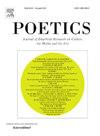提及不可提及之事:在妇女、生命、自由起义之前和期间,伊朗抵抗说唱对机会、代理、情感和身份的感知
IF 2
2区 社会学
0 LITERATURE
引用次数: 0
摘要
在强烈的威权背景下,关于抵抗的学术研究侧重于抗议之前的日常抵抗行为和松散的团结网络,以及抗议期间公开的话语抵抗。这些趋势是脱节的,因为它们忽略了日常生活中围绕持不同政见者的公共话语空间,因此未能将公开的话语抵抗历史化。为了弥合这一差距,我引入了“话语非运动”,它指的是独立于政府、社会运动组织或政治领导人而产生的秘密越界但公开的话语空间。这些空间有助于在抗议之前建立松散的团结网络,并为在没有政治领导人帮助的情况下在适当的时候传播激进的异议奠定基础。在起义期间,创作者将话语性的不运动转化为公开的抗议话语。通过运用批判性话语分析,分析女性、生命、自由运动之前和运动期间的伊朗说唱歌曲,我展示了歌曲如何从含蓄、绝望、寓言和忧郁转变为明确、希望和复仇。这种转变是一个“提及不可提及之事”的过程,是一个公开邀请普通公民参与非同寻常的抵抗行动的过程。本文章由计算机程序翻译,如有差异,请以英文原文为准。
Mentioning the unmentionable: Perception of opportunities, agency, emotions, and identity in Iranian resistance rap prior and during the women, life, freedom uprisings
Scholarship on resistance in a strong authoritarian context focuses on everyday acts of resistance and loose solidarity networks prior to protests and overt discursive resistance during the protests. These trends are disjointed since they ignore the public discursive spaces surrounding dissidents in their everyday life and hence fail to historicize overt discursive resistance. To bridge this gap, I introduce “discursive nonmovements” which refer to covertly transgressive yet public discursive spaces that are produced independent of the government, social movement organizations, or political leaders. Such spaces facilitate the creation of loose solidarity networks prior to protests and build the foundation for communicating radical dissent in opportune times without the help of political leaders. Further during uprisings, creators turn the discursive nonmovements to overt protest discourse. By analyzing Iranian rap songs prior and during the Women, Life, Freedom movement using critical discourse analysis, I show how songs have changed from implicit, hopeless, allegorical, and melancholic to explicit, hopeful, and vengeful. The transition is a process of “mentioning the unmentionable” which serves as a public open invitation for ordinary citizens to engage in extraordinary acts of resistance.
求助全文
通过发布文献求助,成功后即可免费获取论文全文。
去求助
来源期刊

Poetics
Multiple-
CiteScore
4.00
自引率
16.00%
发文量
77
期刊介绍:
Poetics is an interdisciplinary journal of theoretical and empirical research on culture, the media and the arts. Particularly welcome are papers that make an original contribution to the major disciplines - sociology, psychology, media and communication studies, and economics - within which promising lines of research on culture, media and the arts have been developed.
 求助内容:
求助内容: 应助结果提醒方式:
应助结果提醒方式:


